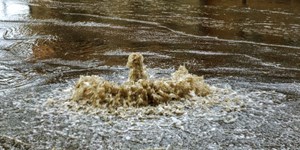Lowell, Mass., to invest $195 million in sewer upgrades in settlement over water pollution
(UI) — The U.S. Environmental Protection Agency (EPA), the Justice Department and the Commonwealth of Massachusetts announced a settlement agreement with the city of Lowell, requiring the city to reduce sewage discharges into the Merrimack River.
Under the consent decree, Lowell will pay a $200,000 penalty for past violations.
A portion of Lowell’s wastewater collection system consists of sewers that convey sanitary sewage and stormwater runoff in a single pipe. During wet weather, untreated combined sewage is discharged through combined sewer overflow (CSO) outfalls to the Merrimack River and its tributaries, including Beaver Brook and the Concord River.
The Merrimack River is a drinking water source for several downstream communities. The settlement requires work to separate wastewater and stormwater, which will minimize the number of times untreated sewage is released into nearby waters.
Lowell will also implement a program to detect and eliminate illicit connections that discharge wastewater to the city’s stormwater system thereby reducing pollution in stormwater that flows into local streams and rivers. Lowell must also establish and implement city ordinances to help prevent stormwater runoff from construction and post construction sites.
The total cost to update the sewer system has been estimated at approximately $195 million.
This consent decree was the result of a joint enforcement action brought by the Justice Department on behalf of the EPA, and the Massachusetts Attorney General’s Office, on behalf of the Massachusetts Department of Environmental Protection.
“For far too long the city of Lowell, Massachusetts has failed to protect the communities that rely on the Merrimack River and other water sources for their drinking water,” said Assistant Administrator David M. Uhlmann of EPA’s Office of Enforcement and Compliance Assurance. “Today’s settlement demonstrates EPA’s commitment to ensure cities and towns meet their obligations under the Clean Water Act to prevent the overflow of sewage, pollutants, and debris into our nation’s waterways.”
This settlement is part of EPA’s continuing efforts to keep raw sewage and contaminated stormwater out of our nation’s waters. Raw sewage overflows and inadequately controlled stormwater discharges from municipal sewer systems introduce a variety of harmful pollutants, including disease causing organisms, metals and nutrients that threaten our communities’ water quality and can contribute to disease outbreaks, beach and shellfish bed closings, flooding, stream scouring, fishing advisories and basement backups of sewage.
Lowell owns and, through the Lowell Regional Wastewater Utility, operates the Duck Island Clean Water Facility, a 32 million gallon per day secondary wastewater treatment facility that discharges to the Merrimack River. The treatment facility treats wastewater not only from Lowell but also from the Towns of Chelmsford, Dracut, Tewksbury and Tyngsboro, Massachusetts.
Lowell had previously signed a consent decree with the federal government and the Commonwealth of Massachusetts in 1988 to address its illegal CSO discharges. While several interim actions have taken place, Lowell has not yet fully complied with the federal and state environmental statutes.
The Justice Department’s Environmental Enforcement Section filed today’s proposed consent decree in U.S. District Court for the District of Massachusetts. It is subject to a 30-day public comment period and court approval.
Related News
From Archive

- Glenfarne Alaska LNG targets late-2026 construction start for 807-mile pipeline project
- U.S. water reuse boom to fuel $47 billion in infrastructure spending through 2035
- $2.3 billion approved to construct 236-mile Texas-to-Gulf gas pipeline
- Major water pipe break in Puerto Rico hits over 165,000 customers
- Potomac River Tunnel project enters construction phase beneath Washington, D.C.
- Pennsylvania American Water launches interactive map to identify, replace lead water service lines
- Trump's tariffs drive $33 million cost increase for Cincinnati sewer project
- Utah city launches historic $70 million tunnel project using box jacking under active rail line
- Tulsa residents warned after sewer lines damaged by boring work
- Fatal trench collapse halts sewer construction in Massachusetts; two workers hospitalized




Comments